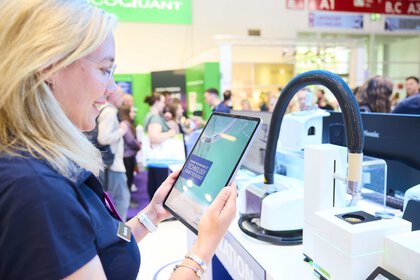Lab 4.0: How the laboratory world is going digital
analytica brings the digital transformation of the laboratory world to life. From March 24 to 27, 2026, in Munich, step into Lab 4.0 and learn about intelligent analyzers, smart lab technology and networking solutions for the lab of the future.
analytica 2026 – a glimpse into the digitized laboratory of the future
The World's Leading Trade Fair for Laboratory Technology, Analysis, Biotechnology, and analytica conference is the innovation barometer for digitalization in the laboratory and provides important impetus for future trends in digital transformation. Immerse yourself in the laboratory of the future and discover live where the digital laboratory is heading. After all, digital transformation has become an important strategic success factor in laboratory management and for the laboratory of the future.
Intelligently networked: a prerequisite for the digital laboratory
The digital mapping of laboratory processes undoubtedly results in a significant increase in efficiency and quality in the laboratory while minimizing safety risks. In addition, legal norms, regulations, and standards can be complied with in a completely reliable manner. With smart, network-enabled laboratory equipment and automated workflows, digitized laboratories remain able to cope with ever-increasing demands.

Digitization makes an important contribution to increasing sustainability in the laboratory
analytica invites you to Lab 4.0. Find out which digital tools can improve the quality of your analyses and analysis results and how you can reduce your costs and save valuable working time and resources.
Discover the important contribution that digitalization also makes to sustainability in the lab. Unnecessary laboratory work and repeated process checks can be avoided at an early stage through intelligent experiment planning and timely warnings, which in turn leads to significant savings in chemicals, consumables, and energy costs. Renowned exhibitors and scientists from around the world will be presenting their digital innovations to the laboratory community at the world's leading trade fair in Munich, setting the direction for the laboratory of tomorrow.
Study 'AI in the Laboratory' available for free download
You can download the joint publication of the German industrial association SPECTARIS and Messe München from 2024 here:
Laboratory digitalization - the top topics at analytica
analytica is your number one event for laboratory digitalization. Look forward to exploring these top topics:
- Lab 4.0: more efficiency and flexibility in the lab of the future while simultaneously improving quality
- Robots and cobots: laboratory automation for digital transformation
- Connectivity: standard interfaces for laboratory networking
- Virtual Reality: how to expand the laboratory world
Plus, at analytica you will experience the whole spectrum of instrument developments and state-of-the-art laboratory technology for Lab 4.0:
- digital transformation of the laboratory world - Lab 4.0 - intelligent laboratory technology - voice control - personalized workflows
- automation - device communication - laboratory robots - cobots
- networking - standardization of interfaces - Laboratory Agnostic Device Standard (LADS) - OPC UA LADS
- sample logistics - barcodes, RFID tags etc. - traceability
- augmented reality - virtual reality - smartglasses in the digital lab
- Big Data - data validation - artificial intelligence - cloud computing - Internet of Things - IT security
- LIMS - laboratory software - electronic laboratory books
Talk to industry leaders in laboratory digitalization
Renowned exhibitors present the latest products and services for the lab of the future (Laboratory 4.0) at analytica.
At analytica 2026, for example, there are:
Greater efficiency, flexibility, and quality improvement in the future lab
Efficient workflows are essential for a laboratory's competitiveness, as they are the only way to cope with increasing demands such as throughput increases, audits, and new legal regulations.
Automated laboratory processes and optimized workflows reduce the workload on laboratory staff, prevent sources of error, and increase the quality of analyses. With modular software and hardware, voice control, and smartphones, it is possible to respond quickly and flexibly to individual user requirements, access options, varying sample volumes, and sensitive data management.
At analytica, international market leaders will showcase digital tools, software tools, user-friendly databases, and platforms for the collection, evaluation, and storage of measurement data, as well as secure and transparent data management.

Connectivity: standard interfaces for laboratory networking
In the smart future lab, analytical and laboratory equipment, sensors, processes, and data libraries are all connected. These networks are controlled by laboratory information management systems (LIMS) and cloud-based solutions.
Harmonization of interfaces remains a prerequisite for networking. All devices must have compatible network access and drivers so that they can communicate with each other, with their users, and with the cloud. A consistent digital transformation of the laboratory integrates data streams, workflows, software, and hardware.

Virtual Reality: Completely new possibilities in the lab world
Virtual reality technologies are already expanding the world of laboratories in many areas, such as the simulation of analyses and syntheses or the implementation of new techniques. Visualization opens up new dimensions in research as well as in routine analysis. In analysis, in the life sciences such as biotechnology, diagnostics, clinical chemistry, and personalized medicine, and even in cell biology, as well as in engineering, these virtual technologies contribute significantly to the expansion and optimization of applications.

In microscopic procedures, for example, augmented reality can significantly improve the quality of examination results, as samples and objects can be viewed and explored virtually, even inside. This increases understanding of the processes being examined and gives scientists new insights into their research.
Augmented reality glasses provide laboratory staff with instructions on work processes, detect errors, warn of incorrect operation, and automatically record the individual work steps at the same time. Sample information and safety instructions for working with toxic chemicals or virulent samples can also appear automatically in the viewer's field of vision, thereby increasing not only the reliability of results but also occupational safety.
Get an overview of the industry at analytica 2026 in Munich and see for yourself how important digital transformation will be for your laboratory of tomorrow!
Talk to international experts at analytica about your laboratory and work with them to develop the right solutions for the problems and challenges in your laboratory!
Be there now and secure your ticket for analytica!
With just a few clicks you can buy your personal ticket to analytica or redeem a voucher.

Unique supporting program round the laboratory of the future
On top of the actual trade show, our extensive suppporting program offers unique insights into the latest theory and practice in lab 4.0.
Forum: Digital Transformation
The new “Digital Transformation” forum will offer product presentations and expert talks as well as panel discussions round big data, chemometrics and bioinformatics on all trade show days. Renowned researchers from Germany and abroad will provide a concentrated overview of novel methods and techniques as well as their practical applications.
More about the “Digital Transformation” forum
Special show: Digital Transformation
See our new Action Area at the newly conceived special show “Digital Transformation”. At hands-on islands you cannot only see workflows at the laboratory, but also get involved in them yourselves, to discover the latest trends of digitalization.
FAQs on laboratory digitalization
The term Lab 4.0 is derived from Industry 4.0, the synonym for the fourth industrial revolution. What it means is: digitalizing and automating all processes as much as possible. In Lab 4.0, the spectrum ranges from the digital capture of incoming samples to the automated evaluation and storage of data. Laboratory digitalization relies on standardized interfaces that enable all devices to communicate fully with each other and to network with management systems, other software and hardware, as well all human actors in the value chain. Artificial intelligence and cloud-based data management are playing an increasingly important role in the digitalized laboratory of tomorrow.
The advantages of laboratory digitalization and automation are manifold: automated processes compensate for the shortage of skilled workers and allow high sample volumes to be handled quickly. At the same time, automation makes the laboratory safer, by reducing the risk of injury and contamination.
Automated processes and laboratory robots really come into their own when dealing with hazardous substances, pathogenic germs and harmful chemicals, but even in trace analysis, manual sample contact should be kept to a minimum to avoid contamination. Laboratory automation also increases the reliability of analysis and research results. Partially or fully automated processes are less prone to errors and are also more transparent and easier to trace. Automation also allows contract laboratories to respond more flexibly to varying sample volumes. analytica is a one-stop-shop for information about the potential and benefits of digitalization and automation. Learn how to make lab processes more efficient while reducing the workload of lab staff.
Laboratory robots can take over repetitive steps and routine procedures. They are also used in high-throughput screening, enzyme assays and related applications. Good automation solutions already exist for activities such as pipetting and microplate handling. Autosamplers have also long been available on most analyzers. Increasingly, sample preparation, such as dilution and addition of reagents, is also being automated.
In addition to such automation solutions, there are adaptive cobots that work hand in hand with laboratory personnel and take over certain work steps. Robots are also particularly helpful when handling hazardous substances and for activities that require extreme precision.
It is generally accepted that robots cannot replace humans, and this goes for labs too. They relieve laboratory personnel and take work off their hands, but not away from them. In the future, it is likely that no human will have to perform repetitive, monotonous and easily automated tasks. Instead of spending hours pipetting or labeling tubes, lab workers can devote their time to more value-added and creative activities. However, no one can accurately predict how the laboratory world will change going forward as a result of artificial intelligence and robots that are self-learning and autonomous, because the digital transformation has only just begun.






